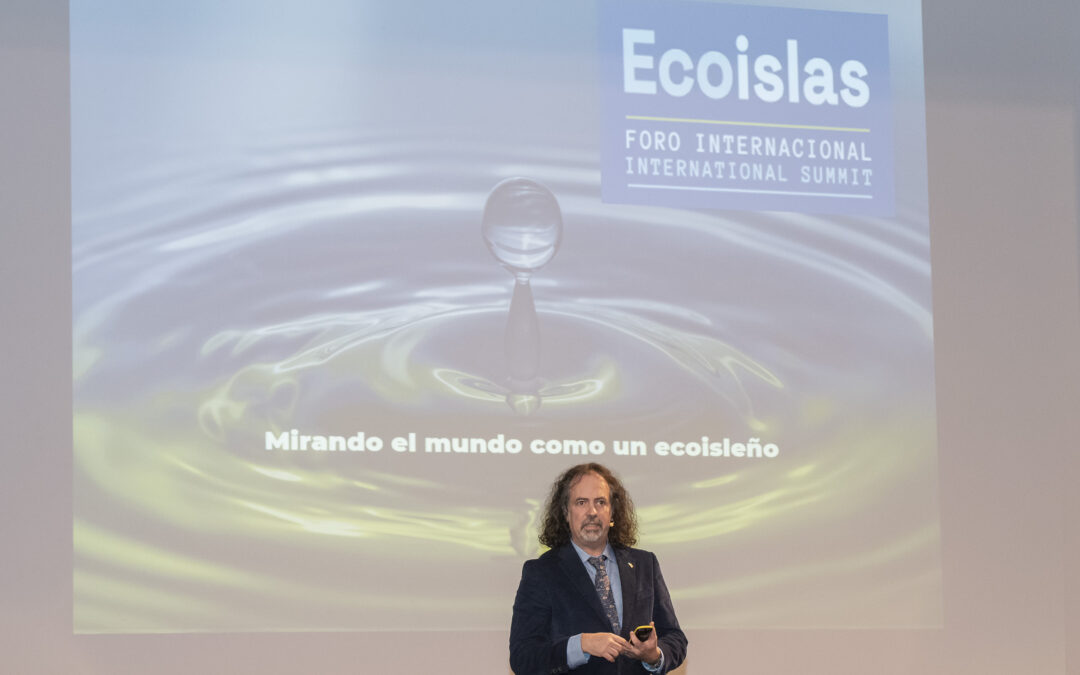- The event was inaugurated by the president of the Cabildo de Gran Canaria, Antonio Morales, and will feature four international speakers, as well as over 60 national and local experts
- The Forum, which is taking place today and tomorrow at Infecar, began with the opening plenary session by Manuel Maqueda
Las Palmas de Gran Canaria, Wednesday 2 February 2023-. The first International Ecoislas Forum was inaugurated today at Infecar with the aim of “becoming an international reference for addressing the necessary ecological transition in island environments”, as defined by the president of the Cabildo de Gran Canaria, Antonio Morales.
Being an Ecoisland means developing a “socio-economic transformation project for our development model, in order to move towards an environmentally sustainable, socially just, and self-centred model, which focuses on the characteristics of one of the most unique territories in the world”. For Antonio Morales, it is an exercise in “working together with other territories, particularly island territories, to be a space for discussion, proposals, and the promotion of measures aimed at enhancing the transition towards a more sustainable and self-sufficient, socio-economic model, with a specific focus on islands”.
Thus, this first International Ecoislands Forum is the place to debate and reflect on solutions to alleviate the effects of climate change which “are felt more intensely by islands, now and in the future”, as Morales pointed out. In this regard, he delved into the “triple sovereignty” of energy, water, and food, highlighting projects like Renovagua, which aims to “produce 10 MW of renewable energy and reduce the energy and economic dependence of desalination and purification plants on fossil fuels, decreasing the use of conventional energy in water production and distribution by 40%”. He also mentioned the support for the primary sector, which has managed to increase cultivated land by nearly 300 hectares and cultivable land by 30,000 hectares.
One of the challenges is to “move towards a 100% renewable island as soon as possible,” he said, celebrating that Gran Canaria “leads renewable energy production in the Canary Islands, where the installation of self-consumption panels has increased elevenfold,” and €66 million is being invested “for the Cabildo to produce 75% of the energy it consumes.”
The Salto de Chira hydroelectric power station will mean “achieving more than 50% renewable energy on the island by 2026 and will allow a significant reduction in carbon dioxide emissions by more than 20%”. Gran Canaria is “the first island in the Canary Islands to have a climate change mitigation and adaptation strategy, the first to develop a circular economy diagnosis,” and this Forum is expected to advance this path, which “will help make possible the hope for the change needed by the Canary Islands, Spain, and the whole planet.”
With all this, the first plenary session of the International Ecoislands Forum featured the participation of Manuel Maqueda, who teaches Applied Circular and Regenerative Economics at Harvard University, and called for “a change of mindset to achieve sustainability on the islands, which concerns us all,” and to “be good ancestors” for future generations. For Maqueda, it is necessary to “try to decouple economic value from the extraction of limited resources and the generation of waste” for a “different” type of management focused on “maintaining value for as long as possible.” This shift involves “leaving behind disposable items and those that quickly become obsolete” to return to “a mentality of repairing, using, sharing, and being good stewards of resources.”
“We can discuss how to measure the impact and the kind of impact, but it is clear that islands have a capacity limit” and are already receiving “emergency signals and calls for this new consciousness, this new economy.” He warned of the “enormous vulnerability” of islands, which are “a dead end” for waste. The “true circular economy is about designing for the full lifecycle of resources,” and in this challenge that will reach all territories, “islands are the front line” with the “possibility of leading the world in this necessary change.”
The circular economy must reflect the regenerative capacity of nature, because that “is what makes our planet different.” In his presentation, Manuel Maqueda introduced the concept of ‘Ecoislander’, someone who recognises the need for “a diverse economic activity, measuring the health of the biosphere daily, and being exponential and adaptive.” The future “is here but not evenly distributed,” and he welcomed the fact that this First International Ecoislas Forum will be useful to “learn from successful cases on the islands.”
Carbon Footprint Measurement
The First International Ecoislas Forum will be a climate-neutral event thanks to its partnership with the company Circular Carbón, which will address all areas of the event with actions to measure, reduce, and offset the emissions produced, both in the planning phase and during the event.
This first edition includes an action plan to limit greenhouse gas emissions through circularity actions in various areas of work, materials, merchandising, catering, energy, waste and the participant’s transportation, in addition to ultimately offsetting emissions that cannot be reduced with reforestation actions on the island.
Two Days of Intense Debate
Alongside four international experts and over 60 speakers from academic, administrative, financial, business, and social sectors, the First International Ecoislas Forum will delve into the four main pillars for real and successful change: the circular and blue economy; energy, water and mobility; climate change adaptation; and regenerative tourism. Today’s sessions will feature a dozen parallel sessions with experts in each area, practical case studies will be discussed, and the presentation of the annual ‘Greening the Islands’ report. The afternoon will begin at 4:00 p.m., with the plenary session by Bernard Feltz, a biologist, philosopher, and emeritus professor at the Catholic University of Leuven, which will kick off the evening programme.

